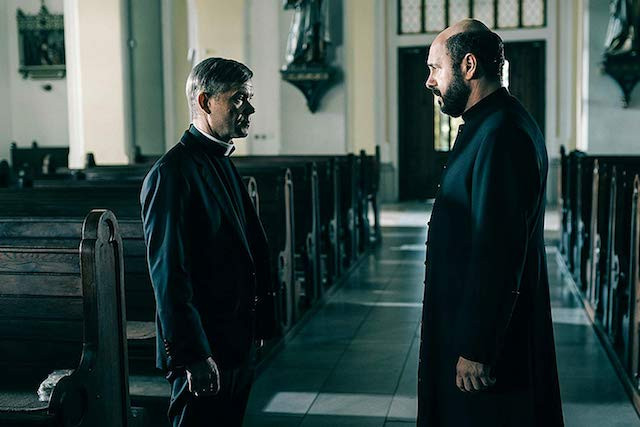Based on real events, Kler (The Clergy), by the director Wojciech Smarzowski, which includes testimonies of survivors, features an alcoholic priest who encourages his lover to have an abortion, a priest accused of abusing a young boy, a senior cleric engaged in corruption and blackmail, and a grotesque, foul-mouthed archbishop cutting deals with politicians and mobsters, all operating with impunity against the backdrop of a passive and credulous society portrayed as complicit in the crimes being committed.
The film broke Polish box officer records on its opening weekend , and has been seen by almost 3 million people since its release at the end of September.
The release came a few weeks after a landmark court decision in Poznan, north-west Poland, against a religious order. The judge ruled that the order bore responsibility for the fate of a girl, then 13, who was abducted and repeatedly raped over 10 months by one of its priests, and that it would have to pay hundreds of thousands of pounds in damages. The priest was arrested in 2008 and served four years in prison, but was removed from the order only last year.
This month, there was outrage when a conservative commentator said of the survivor “even whores don’t earn so well”, and that the priest had only “put his hand up her skirt”. She is taking legal action.
Some members of the Polish clergy and its supporters have reacted angrily to Kler and the growing pressure on the church, dismissing the film as “vulgar clergyphobia”. Gazeta Polska, a rightwing newspaper, reproduced the film poster on billboards across Poland with the images of national heroes including Fr Jerzy Popiełuszko, who was murdered by communist security services in the 1980s, and Fr Maximilian Kolbe, who volunteered to die in place of another inmate at Auschwitz. The poster reads: “The clergy: our treasure in the fight against Nazism, communism, LGBT and Islamists.”
The Polish episcopate has remained silent throughout the controversy, although some individual bishops have attempted to address the issue head on.
“We appeal to God for mercy and especially for God’s blessing and case for all of those who are suffering because of us,” wrote Andrzej Czaja, the bishop of Opole, in south-west Poland, in a letter read out to his congregation last Sunday. He promised to publish information about instances of abuse.
According to reports in the Polish press, however, a number of priests in his diocese either refused to read out the bishop’s letter or omitted references to the paedophile scandal, including his appeal for victims of abuse to come forward.
“A majority of hierarchs and lay people [in the church in Poland] are still under the illusion that we don’t have a genuine problem,” Zbigniew Nosowski, the editor of Więź, a Catholic quarterly, told the liberal broadsheet Gazeta Wyborcza.
Christian Davies in Poland
